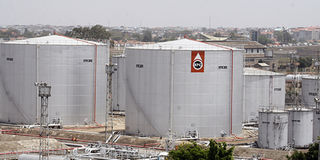Four banks to fund pipeline

Kenya Pipeline is seeking to increase the flow of fuel to Western Kenya region. Photo / File
What you need to know:
- The Sh8.2bn will partly finance the construction of a parallel fuel pipeline from Nairobi to Eldoret
Kenya Pipeline Company is borrowing $109 million (Sh8.2bn) from a consortium of banks to finance the construction of a parallel petroleum pipeline from Nairobi to Eldoret.
CfC Stanbic Bank is the lead arranger of the syndicated loan and building work is set to commence soon.
“A consortium of bank are providing $109 million, which is about 50 per cent of project cost and KPC will fund the balance from internally generated resources,” said Managing Director Selest Kilinda.
Fuel shortage
He said the 14-inch diameter multi-product oil pipeline covering 325km would eliminate the incessant fuel shortage experienced in western Kenya once its completed in about 18 months.
Under the lending terms, CfC Stanbic, Commercial Bank of Africa, Citibank Kenya and Co-operative Bank will directly pay contractors after verifying work in progress and the validity of completion certificates.
KPC has awarded the main works to China Petroleum Pipeline Engineering Corporation (CPPE) at a cost of $179 million (Sh13.4 billion).
A consortium of Shengli Engineering and Consulting Company Ltd and Runji and Partners Consulting Engineers is the project consultants, while M/S Floweserve of Netherlands will supply the mainline pumps at a cost of 4,118,480 euros.
The main contract was signed on October 30 last year with a contract commencement date of November 16, 2009. KPC had in 2008 agreed on the syndicated loan of Sh8.2 billion with the banks.
But the credit line was held up by the banks after a scandal involving irregular release of oil under bond belonging to Triton Petroleum (now in receivership) was unearthed in which KPC lost Sh7.6 billion.
The scandal, which jeopardised guarantees of some financiers including KCB (Sh1.8 billion) and Glencore Energy UK (Sh2.2 billion), went down with then Managing Director George Okungu and a number of senior staff.
To restore confidence in KPC, senior managers were appointed to streamline operations and new rules for collateral management agreement (CMA) system of fuel imports were introduced in 2009.
KPC has also streamlined operations of Collateral Financing Arrangement (CFA), which is being captured by System Application Product (SAP) software for accountability and transparency.
Mr Kilinda said marketers are required to arrange for consignment financing with banks and after conclusion send notification on vessel name, date of discharge, volume and financier’s signatories to KPC.
He said the parallel Nairobi- Eldoret pipeline would initially pump 390 cubic metres of fuel per hour concurrently with the existing western Kenya pipeline capacity of 210 cubic metres per hour.
“Fuel flow rate to western Kenya will increase to about 610 cubic metres per hour, which compares well with the pumping capacity of the Mombasa-Nairobi pipeline of 830 cubic metres per hour,” he said.
Westerm Kenya is currently served by an eight-inch diameter pipeline from Nairobi to Burnt Forest, where it narrows to six inches to Eldoret.
Another six-inch pipeline branches at Sinendet to Kisumu.




